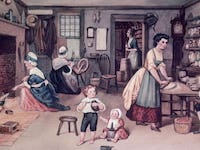No Such Thing as Idle Hands:
The History of Women's Work
A look at the amazing variety of things women used to have to know how to do to keep their families alive. Through folksongs and a popular book published by Lydia Child in 1823, The American Frugal Housewife, Diane explores a wealth of household arts: cooking, brewing, baking, cheese-making, candle-dipping, soap-making, laundering, spinning, weaving, sewing clothes and quilts, and tending animals and the garden. Widowers in past centuries remarried almost immediately, especially if they had children, because life was nearly impossible without a woman to handle a mountain of tasks.
We examine personal care, including advice to wash your hair in New England rum, and remedies for various ailments, such as quincy, dropsy, and piles. Both cooking and healing required an extensive knowledge of plants and animals, and how to use them safely.
Songs include:
The Serving Girl's Holiday, in which a woman looks forward to a short break from cleaning, baking, and spinning.
Twelve to One, Diane's own reflection on spinning and weaving.
Charming Billy, in which a suitor focuses on the important things about a potential wife: can she cook, spin, bake, etc., etc.
John o' Dreams, a lovely Irish lullaby noting that sleep is the great equalizer, a comfort available to rich and poor alike.
Lord Rendal, in which a dinner of eels proves fatal. Did she do it on purpose?
The Housewife's Lament, bemoaning the endlessness of housework.
Father Grumble, in which a husband and wife swap roles for a day, and the husband finds multitasking to be quite a challenge.
For more information, please contact us.

